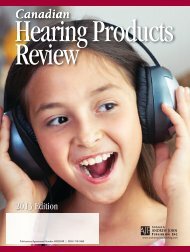Volume 8 Issue 3 (pdf) - Andrew John Publishing Inc
Volume 8 Issue 3 (pdf) - Andrew John Publishing Inc
Volume 8 Issue 3 (pdf) - Andrew John Publishing Inc
You also want an ePaper? Increase the reach of your titles
YUMPU automatically turns print PDFs into web optimized ePapers that Google loves.
|<br />
Figure 2. PEACH scores by age (filled circles) and<br />
regression lines from typically developing children<br />
with aided PCHI. The solid line is an s-shaped<br />
regression for children of all ages and the dashed<br />
line is a linear regression for children older than<br />
24 months.<br />
Figure 3. PEACH scores by age from the three subgroups: typically<br />
developing (circles), comorbidities (squares) and complex factors<br />
(triangles). Symbols represent average percentage scores for each<br />
subscale and vertical bars represent the standard deviation around<br />
the mean.<br />
corrected) scores for children older than<br />
24 months of age and typical<br />
development.<br />
Overall PEACH scores for all children in<br />
the study ranged from 13.64 to 100%<br />
(mean=74.47%; SD=16.87). Descriptive<br />
statistics are reported for 17 typically<br />
developing children, 16 children with<br />
comorbidities and 32 children with<br />
complex factors related to hearing aid use<br />
(Figure 3). These scores differ markedly<br />
from published normative ranges 5 for<br />
this scale for typically developing<br />
children.<br />
A multivariate analysis of covariance<br />
(MANCOVA) was conducted to<br />
determine the impact of degree of<br />
hearing loss and complexity (three-level<br />
independent variable) on the scores for<br />
the PEACH Quiet and Noise subscales.<br />
Results indicated that the multivariate<br />
effect of degree of hearing loss was<br />
significant (F [2,70] = 7.43, p < 0.05,<br />
ŋ 2 =0.179) but presence of complexity<br />
was not (F [2,70] = 0.37, p > 0.05, ŋ 2 =<br />
0.011). Univariate effects confirmed that<br />
children who are typically developing or<br />
have complexities did not differ on their<br />
PEACH scores for either the Quiet<br />
(F [2,73] = 0.39, p > 0.05) or Noise<br />
(F[2,73] = 0.53, p >0.05) subscales.<br />
However, the degree of hearing loss had<br />
a significant impact on PEACH scores for<br />
the Quiet (F [1,73] = 9.59, p 0.05)<br />
subscales. Regression analysis of the<br />
entire sample revealed a decrease in<br />
overall PEACH scores with increasing<br />
hearing loss (R 2 = 0.07; F = 4.99, df = 72,<br />
p = 0.03).<br />
suMMarY and CLiniCaL<br />
iMpLiCations<br />
In summary, typically developing<br />
children who were identified and fitted<br />
early with high quality amplification<br />
reach age-appropriate auditory development<br />
milestones (LittlEARS) and display<br />
typical auditory performance (PEACH).<br />
Children with comorbidities and<br />
complex factors display different<br />
auditory development trajectories on the<br />
LittEARS compared to their typically<br />
developing peers. PEACH scores for<br />
typically developing children in this<br />
sample are approaching the score<br />
achieved by normal hearing children<br />
(90%) by age three years. 5 Regression<br />
analyses indicated there is no age-related<br />
effect on overall PEACH score for<br />
children who are typically developing<br />
and older than 24 months: this may<br />
simplify clinical use of the tool as it<br />
obviates age-corrected scoring. Further<br />
analysis indicated that the degree of<br />
hearing loss impacts scores on the<br />
PEACH but complexity does not.<br />
This study contributes to a better<br />
understanding of functional outcomes<br />
for children within an EHDI program<br />
using a systematic approach to outcome<br />
evaluation.<br />
26 CANADIAN HEARING REPORT | REVUE CANADIENNE D’AUDITION






